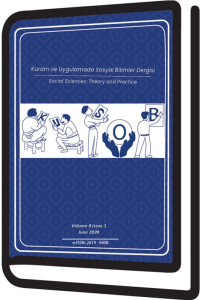Matematik Öğretmenlerinin Geometri Öğretiminde Bilgisayar Teknolojilerinden Yararlanmaya Yönelik Görüşleri
Abstract
Geometri, matematiğin aksiyomatik yapısını yansıtan bir öğrenme alanı olup uzamsal düşünmenin ön planda olduğu formel bir bilimdir. Özellikle ortaokul kademesinde öğrencilerin derin ve anlamlı öğrenmelerinin desteklenerek sezgisel düşünme becerilerinin geliştirilmesi bağlamında bilgisayar tabanlı teknolojilerin öğretim süreçlerinde etkin olarak kullanılması oldukça önemlidir. Bu çalışmada ortaokulda görev yapan matematik öğretmenlerinin geometri öğretimi sürecinde bilgisayar ve internet tabanlı teknolojilerin kullanımına yönelik görüşlerinin alınması amaçlanmıştır. Nitel araştırma yöntemlerinden durum çalışması deseninde tasarlanan çalışmaya devlet okullarında görev yapan on üç deneyimli matematik öğretmeni katılmıştır. Yarı yapılandırılmış form aracılığıyla toplanan verilerin içerik çözümlemesi yapılmıştır. Çalışmanın sonuçlarına göre matematik öğretmenleri geometri öğretiminde teknolojiden yararlanmanın bilincine sahip oldukları, dinamik yazılımların ve eğitici platformların öğrencilerin uzamsal becerilerinin gelişimine katkı sunduğunun farkında oldukları ancak teknopedagojik yeterliklerinin sınırlı olduğu anlaşılmıştır.
References
- Adelabu, F.M, Makgato, M., and Ramaligela, M.S. (2019). The Importance of Dynamic Geometry Computer Software on Learners’ Performance in Geometry. The Electronic Journal of e-Learning, 17(1), 52-63. http://dx.doi.org/10.31258/jes.1.1.p.79-91 Adelabu, F., Makgato, M., & Ramaligela, S. M. (2020). Teacher and student attitude toward the use of dynamic geometry computer software in teaching and learning mathematics. The International Journal of Interdisciplinary Educational Studies, 15(2), 37. https://doi.org/10.18848/2327-011X/CGP/v15i02/37-49 Açıkgül, K. (2022). Mathematics teachers' opinions about a GeoGebra-supported learning kit for teaching polygons. International Journal of Mathematical Education in Science and Technology, 53(9), 2482-2503. https://doi.org/10.1080/0020739X.2021.1895339
- Akgül, M. B. (2014). The effect of using dynamic geometry software on eight grade students’ achievement in transformation geometry, geometric thinking and attitudes toward mathematics and technology. [Master thesis]. Middle East Technical University.
- Alan, S., Akkoç, H., Yeşildere, S., & Ülger, T. K. (2021) Matematik Öğretmenlerinin Teknoloji Entegrasyon Yaklaşımlarının Enstrumantal Orkestrasyon Çerçevesinde İncelenmesi. Batı Anadolu Eğitim Bilimleri Dergisi, 12(2), 406-431. https://doi.org/10.51460/baebd.825500
- Altıntaş, E., İlgün, Ş., & Angay, M. (2022). İlköğretim Matematik Öğretmenlerinin Geometri Dersinin İşlenişi İle İlgili Görüşleri. Artvin Çoruh Üniversitesi Uluslararası Sosyal Bilimler Dergisi, 8(1), 87-106. https://doi.org/10.22466/acusbd.1101910
- Baki, A. (2018). Matematiği öğretme bilgisi (2. Baskı). Pegem Akademi https://doi.org/10.14527/9786052410318
- Bhagat, K. K., Yang, F. Y., Cheng, C. H., Zhang, Y., & Liou, W. K. (2021). Tracking the process and motivation of math learning with augmented reality. Educational Technology Research and Development, 69(6), 3153–3178. https://doi.org/10.1007/s11423-021-10066-9
- Bozkurt, G. (2022). Matematik eğitiminde teknoloji odaklı gerçekleştirilen bir proje kapsamında matematik öğretmenlerinin teknolojiye yönelik görüş ve farkındalıklarının incelenmesi. Muğla Sıtkı Koçman Üniversitesi Eğitim Fakültesi Dergisi, 9(1), 196-211. https://doi.org/10.21666/muefd.951476
Abstract
Geometry, reflecting the axiomatic structure of mathematics, is a formal science where spatial thinking takes precedence. Especially at the middle school level, the effective use of computer-based technologies in instructional processes is crucial for supporting students' deep and meaningful learning and enhancing their intuitive thinking skills in the context of geometry education. The aim of this study was to gather the opinions of middle school mathematics teachers regarding the use of computer and internet-based technologies in the geometry instruction process. thirteen experienced mathematics teachers working in public schools participated in the study, which was designed using a case study pattern as a qualitative research method. Content analysis was conducted on the data collected through a semi-structured form. According to the results of the study, mathematics teachers are aware of the importance of utilizing technology in geometry instruction. They recognize that dynamic software and educational platforms contribute to the development of students' spatial skills. However, due to limited Technological Pedagogical Content Knowledge, teachers tend to continue using other methods.
References
- Adelabu, F.M, Makgato, M., and Ramaligela, M.S. (2019). The Importance of Dynamic Geometry Computer Software on Learners’ Performance in Geometry. The Electronic Journal of e-Learning, 17(1), 52-63. http://dx.doi.org/10.31258/jes.1.1.p.79-91 Adelabu, F., Makgato, M., & Ramaligela, S. M. (2020). Teacher and student attitude toward the use of dynamic geometry computer software in teaching and learning mathematics. The International Journal of Interdisciplinary Educational Studies, 15(2), 37. https://doi.org/10.18848/2327-011X/CGP/v15i02/37-49 Açıkgül, K. (2022). Mathematics teachers' opinions about a GeoGebra-supported learning kit for teaching polygons. International Journal of Mathematical Education in Science and Technology, 53(9), 2482-2503. https://doi.org/10.1080/0020739X.2021.1895339
- Akgül, M. B. (2014). The effect of using dynamic geometry software on eight grade students’ achievement in transformation geometry, geometric thinking and attitudes toward mathematics and technology. [Master thesis]. Middle East Technical University.
- Alan, S., Akkoç, H., Yeşildere, S., & Ülger, T. K. (2021) Matematik Öğretmenlerinin Teknoloji Entegrasyon Yaklaşımlarının Enstrumantal Orkestrasyon Çerçevesinde İncelenmesi. Batı Anadolu Eğitim Bilimleri Dergisi, 12(2), 406-431. https://doi.org/10.51460/baebd.825500
- Altıntaş, E., İlgün, Ş., & Angay, M. (2022). İlköğretim Matematik Öğretmenlerinin Geometri Dersinin İşlenişi İle İlgili Görüşleri. Artvin Çoruh Üniversitesi Uluslararası Sosyal Bilimler Dergisi, 8(1), 87-106. https://doi.org/10.22466/acusbd.1101910
- Baki, A. (2018). Matematiği öğretme bilgisi (2. Baskı). Pegem Akademi https://doi.org/10.14527/9786052410318
- Bhagat, K. K., Yang, F. Y., Cheng, C. H., Zhang, Y., & Liou, W. K. (2021). Tracking the process and motivation of math learning with augmented reality. Educational Technology Research and Development, 69(6), 3153–3178. https://doi.org/10.1007/s11423-021-10066-9
- Bozkurt, G. (2022). Matematik eğitiminde teknoloji odaklı gerçekleştirilen bir proje kapsamında matematik öğretmenlerinin teknolojiye yönelik görüş ve farkındalıklarının incelenmesi. Muğla Sıtkı Koçman Üniversitesi Eğitim Fakültesi Dergisi, 9(1), 196-211. https://doi.org/10.21666/muefd.951476
Details
| Primary Language | Turkish |
|---|---|
| Subjects | Mathematics Education |
| Journal Section | Research Article |
| Authors | |
| Early Pub Date | June 29, 2024 |
| Publication Date | June 30, 2024 |
| Submission Date | March 4, 2024 |
| Acceptance Date | May 2, 2024 |
| Published in Issue | Year 2024 Volume: 8 Issue: 1 |


